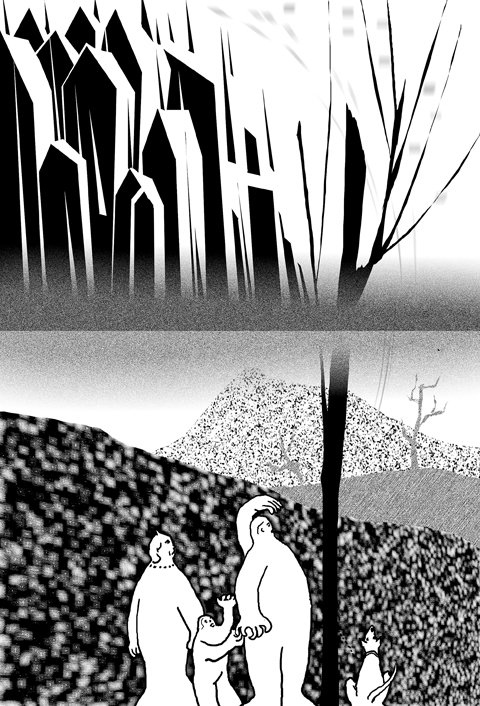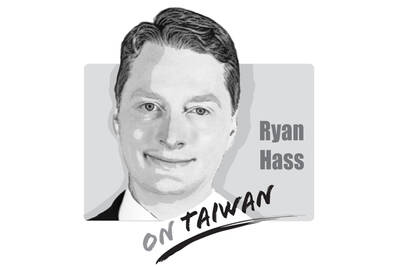This is nothing. Well, nothing by comparison to what’s coming. The financial crisis for which we must now pay so heavily prefigures the real collapse, when humanity bumps against its ecological limits.
As we goggle at the fluttering financial figures, a different set of numbers passes us by. Last Friday, Pavan Sukhdev, the Deutsche Bank economist leading a European study on ecosystems, reported that we are losing natural capital worth between US$2 trillion and US$5 trillion every year as a result of deforestation alone. The losses incurred so far by the financial sector amount to between US$1 trillion and US$1.5 trillion. Sukhdev arrived at his figure by estimating the value of the services — such as locking up carbon and providing fresh water — that forests perform, and calculating the cost of either replacing them or living without them. The credit crunch is petty when compared to the nature crunch.
The two crises have the same cause. In both cases, those who exploit the resource have demanded impossible rates of return and invoked debts that can never be repaid. In both cases we denied the likely consequences. I used to believe that collective denial was peculiar to climate change. Now I know that it’s the first response to every impending dislocation.

ILLUSTRATION: MOUNTAIN PEOPLE
British Prime Minister Gordon Brown, for instance, was as much in denial about financial realities as any toxic debt trader. In June last year, during his Mansion House speech (the British prime minister’s big annual set-piece speech on the economy), he boasted that 40 percent of the world’s foreign equities were now traded here. The financial sector’s success had come about, he said, partly because the government had taken “a risk-based regulatory approach.”
In the same hall three years before, he pledged that “in budget after budget I want us to do even more to encourage the risk takers.” Can anyone, surveying this mess, now doubt the value of the precautionary principle?
Ecology and economy are both derived from the Greek word oikos — a house or dwelling. Our survival depends on the rational management of this home: the space in which life can be sustained. The rules are the same in both cases. If you extract resources at a rate beyond the level of replenishment, your stock will collapse. That’s another noun which reminds us of the connection. The Oxford English Dictionary gives 69 definitions of “stock.” When it means a fund or store, the word evokes the trunk — or stock — of a tree, “from which the gains are an outgrowth.” Collapse occurs when you prune the tree so heavily that it dies. Ecology is the stock from which all wealth grows.
The two crises feed each other. As a result of Iceland’s financial collapse, it is now contemplating joining the EU, which means surrendering its fishing grounds to the common fisheries policy. Already Iceland Prime Minister Geir Haarde has suggested that his countrymen concentrate on exploiting the ocean. The economic disaster will cause an ecological disaster.
Normally it’s the other way around. In his book Collapse: How Societies Choose to Fail or Succeed, Jared Diamond shows how ecological crisis is often the prelude to social catastrophe. The obvious example is Easter Island, where society disintegrated soon after the population reached its highest historical numbers, the last trees were cut down and the construction of stone monuments peaked.
The island chiefs had competed to erect ever bigger statues. These required wood and rope (made from bark) for transport, and extra food for the laborers. As the trees and soils on which the islanders depended disappeared, the population crashed and the survivors turned to cannibalism. Diamond wonders what the Easter islander who cut down the last palm tree might have thought.
“Like modern loggers, did he shout ‘Jobs, not trees!’? Or: ‘Technology will solve our problems, never fear, we’ll find a substitute for wood.’? Or: ‘We don’t have proof that there aren’t palms somewhere else on Easter ... your proposed ban on logging is premature and driven by fear-mongering’?”
Ecological collapse, Diamond shows, is as likely to be the result of economic success as of economic failure. The Maya of Central America, for instance, were among the most advanced and successful people of their time. But a combination of population growth, extravagant construction projects and poor land management wiped out between 90 percent and 99 percent of the population.
The Mayan collapse was accelerated by “the competition among kings and nobles that led to a chronic emphasis on war and erecting monuments rather than on solving underlying problems.” (Does any of this sound familiar?)
Again, the largest monuments were erected just before the ecosystem crashed. Again, this extravagance was partly responsible for the collapse: Trees were used for making plaster with which to decorate their temples. The plaster became thicker and thicker as the kings sought to outdo each other’s conspicuous consumption.
Here are some of the reasons why people fail to prevent ecological collapse. Their resources appear at first to be inexhaustible; a long-term trend of depletion is concealed by short-term fluctuations; small numbers of powerful people advance their interests by damaging those of everyone else; short-term profits trump long-term survival. The same, in all cases, can be said of the collapse of financial systems. Is this how human beings are destined to behave? If we cannot act until stocks — of either kind — start sliding towards oblivion, we’re knackered.
But one of the benefits of modernity is our ability to spot trends and predict results. If fish in a depleted ecosystem grow by 5 percent a year and the catch expands by 10 percent a year, the fishery will collapse. If the global economy keeps growing at 3 percent a year (or 1,700 percent a century), it too will hit the wall.
I am not going to suggest, as some scoundrel who shares a name with me did on these pages last year, that we should welcome a recession. But the financial crisis provides us with an opportunity to rethink this trajectory; an opportunity that is not available during periods of economic success. Governments restructuring their economies should read Herman Daly’s book Steady-State Economics.
As usual I haven’t left enough space to discuss this, so the details will have to wait. Or you can read the summary published by the Sustainable Development Commission (all references are on my Web site). But what Daly suggests is that nations which are already rich should replace growth — “more of the same stuff” — with development — “the same amount of better stuff.” A steady-state economy has a constant stock of capital that is maintained by a rate of throughput no higher than the ecosystem can absorb. The use of resources is capped and the right to exploit them is auctioned. Poverty is addressed through the redistribution of wealth. The banks can lend only as much money as they possess.
Alternatively, we can persist in the magical thinking whose results have just come crashing home. The financial crisis shows what happens when we try to make the facts fit our desires. Now we must learn to live in the real world.

There has been much catastrophizing in Taiwan recently about America becoming more unreliable as a bulwark against Chinese pressure. Some of this has been sparked by debates in Washington about whether the United States should defend Taiwan in event of conflict. There also were understandable anxieties about whether President Trump would sacrifice Taiwan’s interests for a trade deal when he sat down with President Xi (習近平) in late October. On top of that, Taiwan’s opposition political leaders have sought to score political points by attacking the Lai (賴清德) administration for mishandling relations with the United States. Part of this budding anxiety
The diplomatic dispute between China and Japan over Japanese Prime Minister Sanae Takaichi’s comments in the Japanese Diet continues to escalate. In a letter to UN Secretary-General Antonio Guterres, China’s UN Ambassador Fu Cong (傅聰) wrote that, “if Japan dares to attempt an armed intervention in the cross-Strait situation, it would be an act of aggression.” There was no indication that Fu was aware of the irony implicit in the complaint. Until this point, Beijing had limited its remonstrations to diplomatic summonses and weaponization of economic levers, such as banning Japanese seafood imports, discouraging Chinese from traveling to Japan or issuing
Tokyo-Beijing relations have been rapidly deteriorating over the past two weeks as China tries to punish Japan over Japanese Prime Minister Sanae Takaichi’s remarks about Taiwan earlier this month, and the off-ramp to this conflict is yet to be seen. Takaichi saying that a “Taiwan contingency” could cause a “situation threatening Japan’s survival” — which would allow Japan to act in self-defense — has drawn Beijing’s ire and sparked retaliatory measures. Her remark did not gain public attention until Chinese Consul General in Osaka Xue Jian (薛劍) made an apparent threat to behead her. The two sides lodged protests against each
On Nov. 8, newly elected Chinese Nationalist Party (KMT) Chairwoman Cheng Li-wun (鄭麗文) and Vice Chairman Chi Lin-len (季麟連) attended a memorial for White Terror era victims, during which convicted Chinese Communist Party (CCP) spies such as Wu Shi (吳石) were also honored. Cheng’s participation in the ceremony, which she said was part of her efforts to promote cross-strait reconciliation, has trapped herself and her party into the KMT’s dark past, and risks putting the party back on its old disastrous road. Wu, a lieutenant general who was the Ministry of National Defense’s deputy chief of the general staff, was recruited